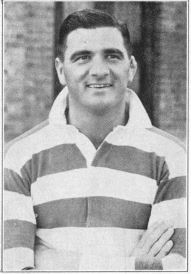
The New Zealand national rugby union team, commonly known as the All Blacks, represents New Zealand in men's international rugby union, which is considered the country's national sport. Famed for their international success, the All Blacks have often been regarded as one of the most successful sports teams in history.

The Zimbabwe national rugby union team, nicknamed the Sables, represents the Zimbabwe Rugby Union in international competition. While sides representing the colony of Rhodesia have played as early as 1910, the modern day Zimbabwe rugby team did not play its first test until 1981, against Kenya. Zimbabwe has competed in two World Cups, in 1987 and 1991, in place of South Africa, who were sanctioned by the IRB at the time due to apartheid. Zimbabwe is categorized as Tier 3 Development One, which prioritizes Zimbabwe over other nations due to historical success as well as popularity of rugby in the nation.

The Rhodesia cricket team played first-class cricket and represented originally the British colony of Southern Rhodesia and later the unilaterally independent state of Rhodesia which became Zimbabwe. In 1980 the Rhodesia cricket team was renamed as the Zimbabwe-Rhodesia cricket team, and in 1981 it adopted its current name of the Zimbabwe national cricket team.
The history of cricket in Zimbabwe, formerly Rhodesia and before 1965 Southern Rhodesia, includes Rhodesia first forming a first-class cricket team in August 1890, and the inaugural Test appearance of Zimbabwe in October 1992.
Ian McIntosh was a Southern Rhodesian-born Zimbabwean rugby union coach. He served as head coach for the Springboks during 1993 and 1994.
Major Patrick William Forbes was a British South Africa Police officer who commanded a British South Africa Company force which invaded Matabeland during the First Matabele War.

Vincent David Bevan was a New Zealand rugby union player.
1949 saw the second full tour of South Africa by a representative New Zealand rugby union team. The All Blacks achieved a record of 13 wins, 7 losses and 4 draws, and they lost the test series 4–0.
Colin "Col" Windon, was a rugby union player and soldier who captained Australia – the Wallabies – in two Test matches in 1951. By age 18 Windon was playing at flanker for his club Randwick in Sydney's Shute Shield. After serving with the Second Australian Imperial Force in the Pacific Theatre during the Second World War, Windon resumed his rugby career in 1946. He was first selected for Australia for their tour of New Zealand that year. Despite the Wallabies losing both their Tests on tour, Windon impressed with his play.
Rugby union in Zambia is a minor but growing sport. The Zambia national rugby union team is currently ranked 67th by World Rugby. The Zambia Rugby Football Union has 9880 registered players and three formally organised clubs.

Rugby union in Zimbabwe is a popular sport and ranks after association football and cricket as one of the oldest and most popular sports in the country. The Zimbabwe national team, commonly known as the Sables, have been playing international rugby since the early 1900s and have made appearances in two Rugby World Cups Zimbabwe at the Rugby World Cup on two occasions. As with rugby union in Namibia, the country's lack of a professional structure, and opportunity for player's to earn an income playing rugby, has been a problem for national organisers.
Ryk Arnoldus Mauritius van Schoor was a South African rugby union centre, a crash ball specialist he was known for his hard tackling. Van Schoor played club rugby for Inyazura RFC and provincial rugby for both Western Province and Rhodesia. He was capped for South Africa twelve times between 1949 and 1953 first representing the team against the 1949 touring New Zealand side. He was later selected for the 1951–52 South Africa rugby tour of Great Britain, Ireland and France. The touring team is seen as one of the greatest South African teams, winning 30 of the 31 matches, including all five internationals.
Robert Barry Lionel "Bobby" Chalmers is a former association football forward who played professionally for the Rhodesia national team and various clubs in South Africa, where he scored 303 goals in all competitions, making him the all-time top goalscorer in the now-defunct South African National Football League. Chalmers captained the Rhodesian team during its unsuccessful attempt to qualify for the 1970 FIFA World Cup, and was its leading goalscorer. In a profile published in 1980, Chalmers was described by journalist Glen Byrom as a "perfect gentleman and sportsman ... Southern Africa's crown prince of soccer". Chalmers died in Durban in 2022.
The 1960 New Zealand rugby union tour of South Africa, was a series of rugby union matches played by the New Zealand national rugby union team in South Africa and Rhodesia.
The 1970 New Zealand rugby union tour of South Africa was a series of matches played between June and August 1970 in South Africa and Rhodesia by the All Blacks.
Rugby union and apartheid had a complex and supportive relationship. From 1948 to 1994, international rugby relations with the country, and also the non-integrated nature of rugby within South Africa drew frequent controversy. South Africa remained a member of the International Rugby Board (IRB) throughout the apartheid era.
Desmond Charles van Jaarsveldt is a Rhodesian-born South African retired rugby union player and former captain of the Springboks. He was nicknamed the "Bald Eagle" due to his pace on the wing and bald head. He became the first Rhodesian to captain South Africa. Upon retiring from playing, he acted as a coach and administrator for Rhodesian rugby during the transition of the country into Zimbabwe.
David John Smith is a South African former rugby union footballer.

John Clother Morkel was a South African-born Rhodesian international rugby union player. He was born in Cape Town, Union of South Africa and was the captain of the Rhodesia national rugby union team and played as a lock.
William John McKeown Conrad was a New Zealand rugby union international.






